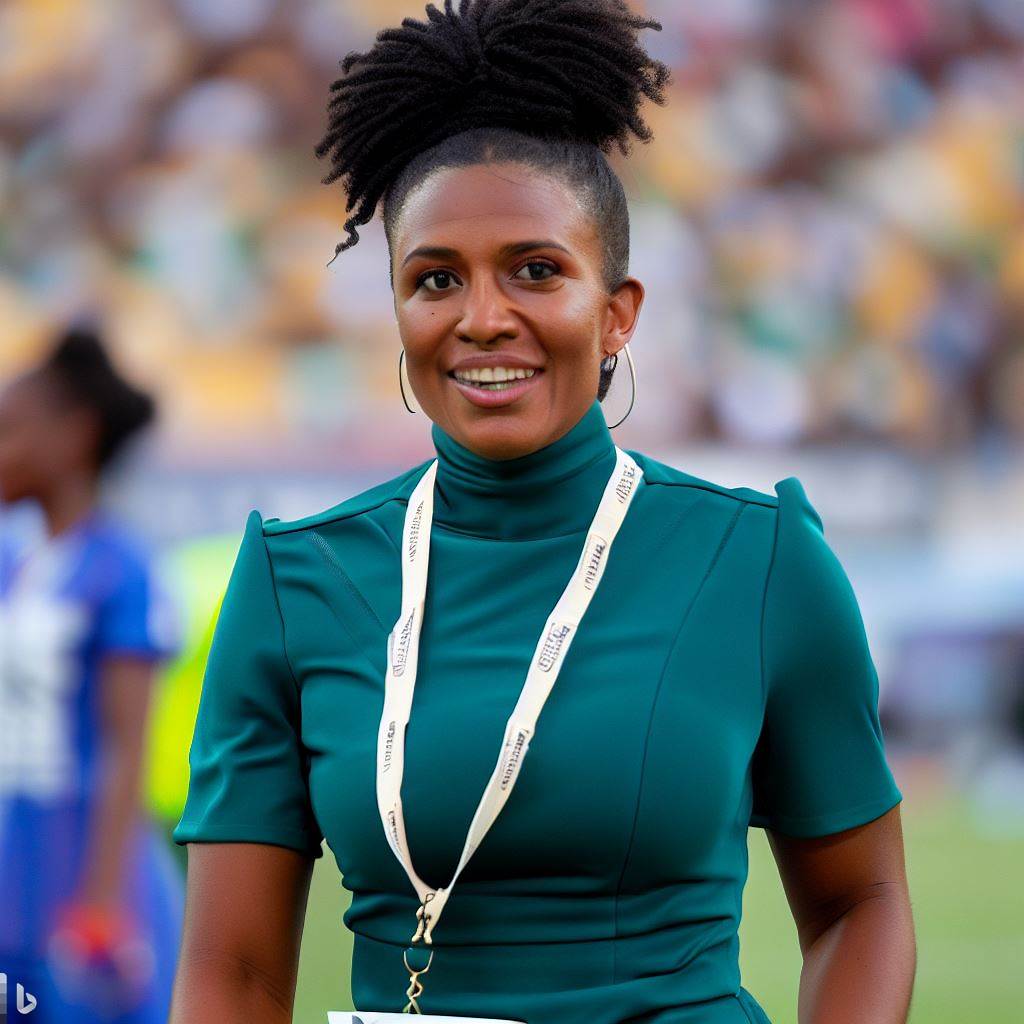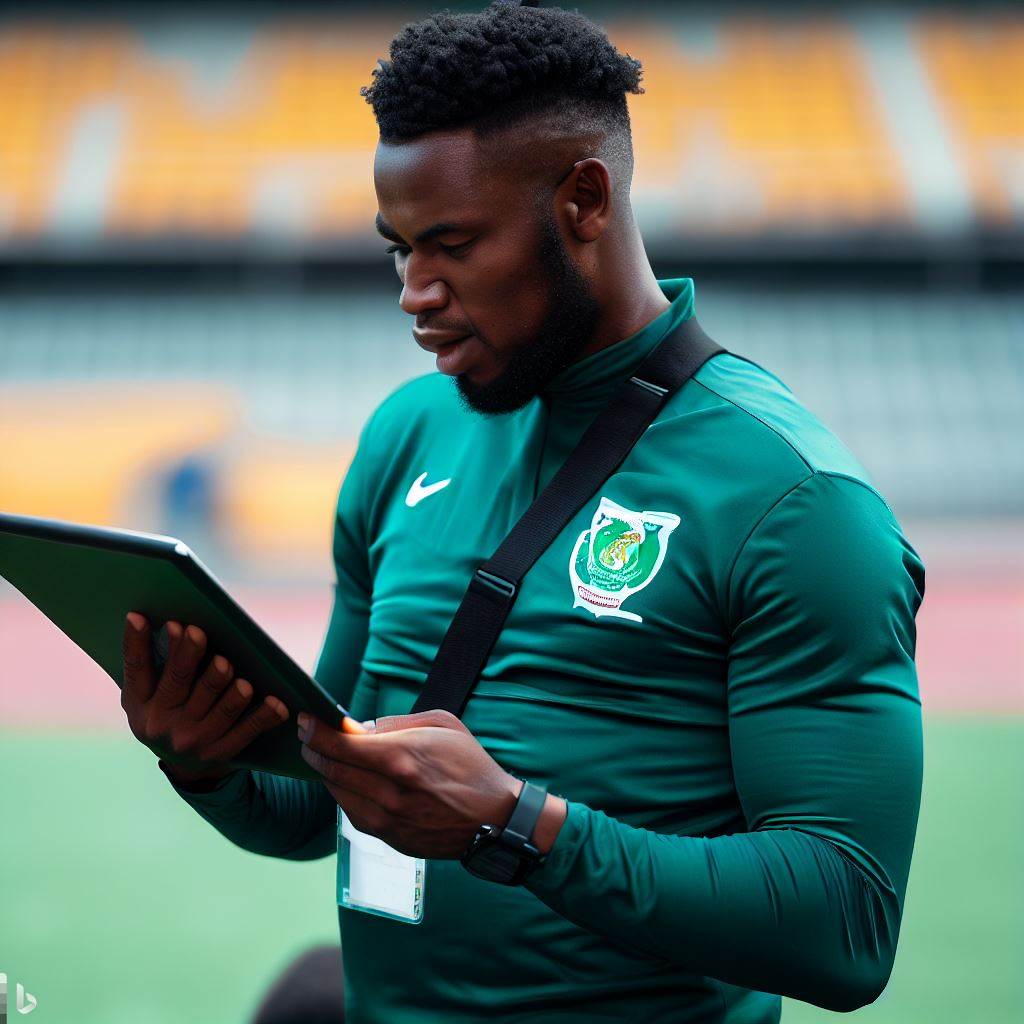Introduction
Discover how Assistant Athletic Trainers in Nigeria are not just shaping athletes but also building their own brand in this insightful post.
In the competitive world of sports, branding isn’t just for products or teams; it extends to the individuals who play a pivotal role in an athlete’s success. Assistant athletic trainers in Nigeria are no exception.
This chapter explores the significance of building a personal brand for these professionals, highlighting its importance in their careers.
- Defining Branding: To understand the concept fully, let’s first define what branding means for assistant athletic trainers in Nigeria. It’s the process of creating a unique and consistent image that represents them in the sports industry.
- Why Branding Matters: Building a strong personal brand is vital because it sets trainers apart in a crowded field. It communicates their expertise, values, and unique contributions to the sports ecosystem.
- Enhancing Recognition: A well-established brand ensures that others in the industry recognize and respect the work of assistant athletic trainers. It opens doors to collaborations, opportunities, and career advancement.
- Trust and Credibility: A strong brand instills trust in athletes, coaches, and sports organizations. It signifies competence, reliability, and a commitment to athletes’ well-being.
- Career Growth: Effective branding can lead to career advancement. It allows trainers to command higher salaries, secure positions with elite teams, and be sought after by athletes.
- Impact Beyond Sports: A strong brand isn’t limited to the sports field. It can also influence the broader community, inspiring healthier lifestyles and promoting sports participation.
Most importantly, building a personal brand is an essential aspect of a successful career for assistant athletic trainers in Nigeria. It elevates their status in the sports industry, creates opportunities for growth, and contributes to the overall development of sports in the country.
Overview of the Nigerian sports industry
The Nigerian sports industry has seen remarkable growth and has become increasingly popular in recent years.
With a population of over 200 million people, sports play an integral role in the lives of Nigerians, both as a form of entertainment and as a means of national pride.
Current status and popularity of sports in Nigeria
Nigeria boasts a rich sporting heritage, nurturing exceptional athletes who shine on the global stage, particularly in sports like football, basketball, athletics, and boxing, all of which enjoy immense popularity and draw massive audiences nationwide.
Crucial to the Nigerian sports industry are assistant athletic trainers, instrumental in safeguarding athletes’ physical well-being and optimizing their performance.
These skilled professionals prevent, diagnose, rehabilitate injuries, and offer immediate medical assistance during events.
Assistant athletic trainers collaborate closely with athletes, coaches, and medical experts to devise injury prevention strategies and tailored training programs.
Their expertise spans biomechanics, nutrition, strength and conditioning, and sports psychology, significantly contributing to athletes’ success.
With a burgeoning interest in sports, Nigeria’s demand for assistant athletic trainers continues to grow as the nation invests in sports development.
These professionals not only bolster athletes’ physical health but also play a pivotal role in shaping their personal brand.
By delivering exceptional care, assistant athletic trainers help athletes excel, enhancing their reputation and marketability. Building a brand in this role necessitates a blend of skills, experience, and networking.
Establishing a robust personal brand can unlock exciting opportunities with professional teams, national associations, and elite training centers.
Networking, through conferences and workshops, is essential for connecting with industry influencers.
Showcasing expertise and experience via various platforms, such as articles, publications, or blogs, can elevate one’s standing.
Utilizing social media effectively on platforms like Instagram, Twitter, and LinkedIn helps establish authority in the field.
Ultimately, building a brand as an assistant athletic trainer in Nigeria demands dedication, lifelong learning, and a passion for sports.
By delivering outstanding care and actively promoting their expertise, these professionals can make a substantial impact, emerging as leaders in the Nigerian sports industry.
Understanding branding in the context of assistant athletic trainers
Definition and significance of branding in the sports industry
Branding refers to the process of creating a unique and recognizable image for a product or service.
In the sports industry, branding plays a crucial role in establishing a strong reputation and attracting fans and sponsors.
Strong branding can differentiate assistant athletic trainers from competitors, helping them stand out in the market.
A well-established brand creates trust and credibility among athletes, coaches, and organizations.
How branding can benefit assistant athletic trainers
- Increased visibility: Building a strong brand helps assistant athletic trainers gain recognition and exposure in the industry.
- Attraction of sponsors: A compelling brand can attract sponsors who are willing to invest in the trainers and their services.
- Enhanced reputation: By establishing a unique brand, assistant athletic trainers can gain a positive reputation within the sports community.
- Career advancement opportunities: A well-known brand opens doors for assistant athletic trainers to work with elite athletes and teams.
- Differentiation from competitors: Branding allows trainers to showcase their unique skills and services, setting them apart from others.
- Increased market value: A strong brand can increase the market value of assistant athletic trainers, leading to higher compensation.
- Trust and credibility: Building a reputable brand helps trainers earn the trust and confidence of athletes and organizations.
- Strong fan base: A recognizable brand can attract a loyal fan base who supports and follows the trainers’ work.
- Networking opportunities: A well-branded assistant athletic trainer can attract networking opportunities with influential individuals in the sports industry.
- Long-term success: A consistent and impactful branding strategy fosters long-term success for assistant athletic trainers.
In review, branding plays a significant role in the sports industry, including for assistant athletic trainers.
By establishing a strong and unique brand, trainers can increase their visibility, attract sponsors, enhance their reputation, and differentiate themselves from competitors.
A successful brand builds trust and credibility, opens doors for career advancement, increases market value, and attracts a loyal fan base.
Assistant athletic trainers should prioritize developing and maintaining their brand to ensure long-term success in the competitive sports industry.
Building a personal brand as an assistant athletic trainer
Identify your unique strengths and skills
- Reflect on your experiences and determine the strengths and skills that set you apart.
- Consider your technical abilities, personal qualities, and specific knowledge in athletic training.
- Identifying your unique strengths will help you differentiate yourself and build a strong personal brand.
- Highlight these strengths in your professional profiles, resumes, and when networking with others.
Develop a strong professional network
- Connect with athletic trainers, athletes, coaches, and other professionals in the field.
- Attend conferences, seminars, and workshops to meet and network with industry experts.
- Engage with online communities and social media platforms to expand your professional network.
- A strong network can provide opportunities, support, mentorship, and collaboration possibilities.
Showcase your expertise through education and certifications
- Continuously seek opportunities for professional development and further education in athletic training.
- Obtain relevant certifications and accreditations to demonstrate your expertise in the field.
- Participate in workshops, webinars, and online courses to acquire new knowledge and skills.
- Share your educational achievements and certifications on your resume and professional platforms.
By identifying your unique strengths and skills, developing a strong professional network, and showcasing your expertise through education and certifications, you can establish yourself as a reputable and trusted professional in the field.
When building your personal brand, it’s important to consistently communicate your values, goals, and achievements.
Networking and engaging with others in the athletic training community will help you build meaningful connections and collaborations.
Attend industry events, join professional associations, and actively participate in discussions to expand your network.
Continuous learning and staying up-to-date with the latest advancements and research in athletic training will enhance your expertise.
Seek opportunities for growth, such as becoming a speaker at conferences or contributing to industry publications.
Utilize social media platforms and professional networks to showcase your knowledge, skills, and accomplishments.
Your personal brand should reflect your passion for athletic training, your commitment to professional development, and your dedication to providing excellent care to athletes.
By building a strong personal brand, you become a valuable asset to athletic organizations and increase your chances of career advancement.
Remember, building a personal brand is a continuous process that requires consistency, authenticity, and a commitment to excellence.
Invest time and effort into establishing and maintaining your personal brand as an assistant athletic trainer, and the rewards will be well worth it.
Read: Top Athletic Training Schools and Programs in Nigeria
Leveraging social media for brand building
Importance of social media presence for assistant athletic trainers
- Social media allows assistant athletic trainers to connect with their target audience.
- It helps in showcasing their expertise, skills, and knowledge in the field.
- By having a strong social media presence, trainers can build credibility and trust among their audience.
- Social media also provides a platform to share success stories, testimonials, and case studies.
- It enables trainers to stay updated on the latest trends and advancements in their industry.
- Assistant athletic trainers can use social media to keep their followers informed about their services.
- It helps in building a community of like-minded individuals and fosters networking opportunities.
- Social media presence allows trainers to engage in conversations and interact with their audience.
- It facilitates feedback and allows trainers to address any concerns or queries raised by their audience.
- Having an active social media presence helps trainers stay competitive and relevant in the industry.
Choosing the right social media platforms
- Assistant athletic trainers should identify the social media platforms that their target audience uses the most.
- Facebook is a popular platform with a wide range of users, making it suitable for reaching a diverse audience.
- Instagram is visually-oriented and can be used to showcase training sessions, achievements, and transformations.
- Twitter is beneficial for sharing quick updates, news articles, and engaging in conversations.
- LinkedIn is a professional networking platform that can help trainers connect with other industry professionals.
- YouTube is ideal for creating and sharing educational videos and tutorials.
- Trainers should choose platforms that align with their personal branding and communication style.
Strategies to effectively promote your personal brand online
- Define your brand message and values to ensure consistency in your social media content.
- Create a compelling and professional profile that highlights your experience, qualifications, and achievements.
- Share valuable and informative content that provides value to your audience.
- Use visuals such as images, videos, and infographics to make your content more engaging.
- Interact with your audience by responding to comments, messages, and reviews in a timely manner.
- Collaborate with other influencers or professionals in your field to expand your reach.
- Use hashtags strategically to increase your content’s visibility and reach a wider audience.
- Monitor and analyze your social media performance using analytics tools to identify what works best for your brand.
- Stay consistent with your posting schedule and maintain an active presence on the chosen platforms.
- Continuously learn and adapt your social media strategy based on the feedback and preferences of your audience.
In a nutshell, social media presence is crucial for assistant athletic trainers in building their personal brand.
It allows them to connect with their target audience, showcase their expertise, and stay updated on industry trends.
By choosing the right platforms and implementing effective strategies, trainers can effectively promote their brand and establish themselves as trusted professionals in the field.
Read: Women in Athletic Training: Voices from Nigeria’s Field

Collaborating with athletes and sports teams for brand exposure
Importance of building relationships with athletes and teams
- Building relationships with athletes and sports teams is crucial for brand exposure.
- By establishing a sense of trust and loyalty, brands can reach a wider audience.
- Athletes and teams have dedicated fan bases that can be tapped into for brand promotion.
- Having a strong connection with athletes and teams creates a positive brand image.
- Athletes and teams may become brand ambassadors, promoting products and services to their followers.
- A strong relationship with athletes and teams allows for more organic and authentic brand exposure.
- A brand associated with successful athletes and teams gains credibility and trust among consumers.
- Collaborations with athletes and teams provide opportunities for innovative marketing strategies.
- Investing time in building relationships with athletes and teams can lead to long-term brand loyalty.
Creating partnerships and sponsorship opportunities
- Partnerships with athletes and teams create win-win situations, benefiting both parties.
- Brands can offer financial support and resources to athletes and teams, fostering their growth.
- Athletes and teams can represent brands, increasing brand visibility and recognition.
- Sponsorship opportunities enable brands to associate themselves with specific sports and events.
- Partnering with athletes and teams allows brands to tap into their dedicated fan bases.
- Brands can leverage athletes’ and teams’ success to enhance their own reputation.
- Through partnerships, brands can showcase their commitment to supporting local talent and sports.
- Creating sponsorship opportunities helps brands align themselves with the values and ideals of athletes and teams.
- Partnerships with athletes and teams provide brands with opportunities for targeted marketing campaigns.
- Sponsors can benefit from increased media exposure and coverage during sports events.
Utilizing endorsements and testimonials
- Athletes and teams can provide endorsements and testimonials for brands, increasing their credibility.
- Endorsements from well-known athletes and teams can significantly boost brand awareness.
- Athletes and teams’ positive experiences with a brand can influence consumer purchasing decisions.
- Endorsements serve as social proof, giving brands an advantage over their competitors.
- Testimonials from athletes and teams can be used in advertising and promotional materials.
- Consumers are more likely to trust and try a brand recommended by their favorite athletes.
- Athletes and teams’ endorsements help create a personal connection between brands and their audience.
- Brands can leverage athletes’ and teams’ popularity to attract new customers and retain existing ones.
- Endorsements and testimonials act as powerful marketing tools, increasing brand loyalty.
- By utilizing endorsements, brands can tap into athletes’ and teams’ influence on social media.
Collaborating with athletes and sports teams is an essential aspect of building a brand in Nigeria.
By building relationships with athletes and teams, brands can access their dedicated fan bases, gain credibility, and create organic brand exposure.
Creating partnerships and sponsorship opportunities further enhance brand visibility and allow for targeted marketing campaigns.
Additionally, utilizing endorsements and testimonials from athletes and teams boosts brand awareness and influences consumer purchasing decisions.
Overall, collaborating with athletes and sports teams in Nigeria is an effective strategy for brand exposure and growth.
Building credibility through community involvement
A strong brand is built not only through delivering quality services, but also by actively engaging with the community.
Assistant Athletic Trainers in Nigeria can establish their credibility by involving themselves in various community activities.
Volunteering and participating in community sports events
Volunteering and taking part in community sports events is a great way for Assistant Athletic Trainers in Nigeria to showcase their skills and build credibility.
By offering their expertise and support, they can demonstrate their commitment to the well-being of athletes and sports enthusiasts.
- Helping out at local schools and sports clubs allows trainers to connect with athletes at a grassroots level and gain valuable experience.
- Assisting during tournaments and competitions enables trainers to demonstrate their capabilities in handling high-pressure situations.
- Offering free workshops or injury prevention sessions educates the community about the importance of athletic training.
Attending conferences, workshops, and seminars
To stay updated with the latest developments in the field, Assistant Athletic Trainers in Nigeria should actively participate in conferences, workshops, and seminars.
- Attending such events provides trainers with opportunities to network with industry professionals and exchange knowledge.
- Learning from experts enhances trainers’ skills and helps them adapt to emerging trends in sports medicine.
- Sharing their gained knowledge and experiences with the community earns them respect and establishes their expertise.
Contributing to the sports industry through mentorship and coaching
Assistant Athletic Trainers in Nigeria can build credibility by actively contributing to the sports industry through mentorship and coaching.
- Mentoring young athletes not only helps improve their performance but also showcases trainers’ ability to nurture talent.
- Coaching local sports teams allows trainers to demonstrate their leadership skills and gain recognition within the community.
- Sharing success stories of mentees and athletes coached builds a positive reputation and boosts credibility.
Ultimately, building credibility as Assistant Athletic Trainers in Nigeria requires active community involvement.
Through volunteering, participating in community sports events, attending conferences, workshops, and seminars, and contributing to the sports industry through mentorship and coaching, these trainers can establish themselves as trusted professionals in the field.
Read: Top Athletic Training Schools and Programs in Nigeria
Evaluating and measuring the success of your brand building efforts
A strong and well-established brand is crucial for the success of any business or organization.
Building a brand is a continuous process that requires careful evaluation and measurement to ensure its effectiveness.
In this section, we will explore the importance of setting clear goals and objectives, tracking and analyzing key performance indicators (KPIs), and making adjustments to optimize your branding strategies.
Setting clear goals and objectives
- To evaluate the success of your brand building efforts, it is essential to establish clear goals and objectives from the beginning.
- These goals should be specific, measurable, attainable, relevant, and time-bound (SMART) to provide a clear direction for your branding strategies.
- For assistant athletic trainers in Nigeria, some possible goals and objectives could include increasing brand awareness, enhancing brand reputation, and attracting more clients or athletes.
- By setting clear goals and objectives, you can track and assess the progress of your brand building efforts effectively.
- Regularly review and update your goals and objectives as your brand evolves and adapts to market changes and customer preferences.
Tracking and analyzing key performance indicators (KPIs)
- Key performance indicators (KPIs) are essential metrics used to evaluate the success and performance of your brand building efforts.
- Choose KPIs that are relevant to your goals and objectives, such as website traffic, social media engagement, customer feedback, or lead conversion rates.
- Regularly monitor and analyze these KPIs to gain insights into the effectiveness of your branding strategies.
- Use tools and analytics platforms to track and measure KPIs accurately, enabling data-driven decision-making.
- Compare current KPIs with previous results to identify trends, patterns, and areas for improvement in your brand building efforts.
Making adjustments and optimizing your branding strategies
- Evaluation and measurement of your brand building efforts provide valuable insights that can guide necessary adjustments and optimizations.
- Identify areas where your branding strategies are underperforming or not aligning with your goals and objectives.
- Based on the analysis of KPIs, make data-driven decisions to refine your branding strategies and improve their impact.
- Experiment with different approaches, messages, and communication channels to optimize the reach and effectiveness of your brand.
- Continuously monitor and evaluate the results of these adjustments, ensuring they align with your goals and objectives.
All in all, evaluating and measuring the success of your brand building efforts is crucial for long-term success.
Setting clear goals and objectives, tracking and analyzing key performance indicators (KPIs), and making adjustments based on data-driven decisions are all essential steps in optimizing your branding strategies.
By constantly evaluating and adapting, assistant athletic trainers in Nigeria can establish a strong and impactful brand that attracts clients and facilitates professional growth.
Read: Women in Athletic Training: Voices from Nigeria’s Field
Conclusion
Building a brand is crucial for assistant athletic trainers as it helps enhance their credibility and visibility.
Assistant athletic trainers in Nigeria are integral to the development and success of athletes and sports teams. Their dedication, expertise, and commitment to promoting health and performance play a pivotal role in shaping the sports landscape in the country.
As the demand for professional sports and athletics continues to grow, the role of assistant athletic trainers becomes increasingly crucial.
Assistant athletic trainers also serve as role models and mentors, inspiring the next generation of sports professionals in Nigeria.
Their influence extends beyond the field, making a positive impact on the lives of aspiring athletes and contributing to the overall development of sports in the country.
As Nigeria continues to produce talented athletes and excel in various sports disciplines, the support and expertise provided by assistant athletic trainers will remain vital. These professionals are instrumental in creating a culture of excellence and in shaping the future of sports in Nigeria.
In a rapidly evolving sports landscape, the role of assistant athletic trainers is set to become even more prominent. Their ability to blend science, technology, and compassion will be crucial in addressing the evolving needs of athletes and sports organizations.
Together with athletes, coaches, and sports enthusiasts, assistant athletic trainers are helping to build a brand of Nigerian sports that is characterized by skill, determination, and success.
On a final note, by focusing on developing a strong brand, assistant athletic trainers in Nigeria can pave the way for success.




